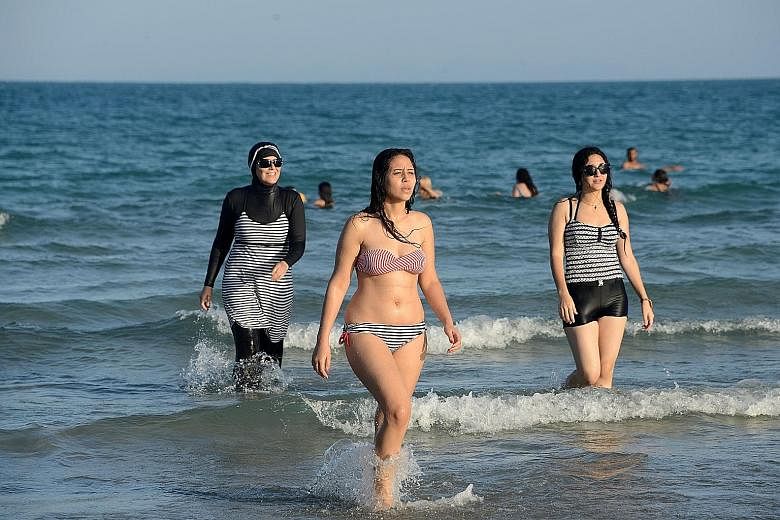It is summer, but the sizzle on the beaches of western Europe isn't so much from the 30 deg C warmth of the sun. It is the heat coming from a ban over a certain style of swimwear.
As more resort towns in France move towards disallowing burkinis - the maximum-coverage swimming garment favoured by Muslim women - questions are raised over what this move will mean for Muslim integration in Europe, especially at a time when relations are so fractured.
Nice, the city on the French Riviera where 86 people died when a lone-wolf attacker drove a truck into crowds celebrating Bastille Day last month, was the latest to say no to the burkini on Friday.
Referring to last month's attack and also the murder of a Catholic priest in the city of Rouen 12 days later, the Nice authorities said they were barring attire that "overtly manifests adherence to a religion at a time when France and places of worship are the target of terrorist attacks".
French Prime Minister Manuel Valls came under fire on Wednesday when he said that "hiding the face or wearing a full-body costume to go to the beach is not in keeping with our ideal of social relations".
As many as 15 towns in France have already banned the burkini; Cannes recently fined three women €38 (S$58) each for wearing the Islamic swimsuit to its beach.
Respect for morality and secularism, hygiene, safety and public threat have been given as reasons justifying the ban, but human rights groups and Muslims have decried the decisions as intolerant, discriminatory and counter-productive as it threatens to further alienate the five million Muslims in France.
Professor Sara Silvestri, an expert in religion and politics at City University London, said the ban plays into the hands of extremists.
"Al-Qaeda and the so-called Islamic State (in Iraq and Syria) thrive every time Western countries give them ammunition to say that the West is discriminating or stigmatising Muslims," she told CNN.
"The effect of these laws is that Muslims feel marginalised and in turn, the feeling of being unwelcome impacts their ability and willingness to integrate into society, and can cause withdrawal and lead to engagement with radical groups."
Islamophobia has been rising in France in the wake of a series of terrorist attacks, and with a presidential election on the horizon, politicians have been quick to throw their weight behind the burkini ban to show their commitment to French secularist values.
The country has long courted controversy over Islamic dressing - it was the first European country to ban face covering in public in 2010 after barring girls from wearing headscarves in state schools in 2004.
Belgium and the Netherlands have also banned the burqa or niqab. Germany could be next. Its Interior Minister, Dr Thomas de Maiziere, on Friday proposed a partial ban on full veils after a string of attacks in the country. Women would not be allowed to cover their faces in public areas such as courts, administrative buildings and schools, and even while driving or attending demonstrations.
"It doesn't fit in with our open society. To show one's face is crucial for communicating, for living together in our society and keeping it together," said Dr de Maiziere.
"In the areas where it serves a function to show one's face, we want to make it a rule... and this means whoever breaks it must feel the consequences."
At least one European country has said it will not follow in France's footsteps. Italy's Interior Minister, Mr Angelino Alfano, said its neighbour's strict laws on Islamic wear could invite backlash and have a detrimental effect.
"The Interior Ministry's responsibility is to guarantee security and to decide the severity of responses which, however, must never become provocations that could potentially attract attacks," Mr Alfano told the Corriere della Sera daily newspaper.
Mr Alfano, who will table a new security law next month, wants to tighten regulation on preachers and mosques in the country instead. He has already deported 109 people suspected of promoting radical Islam in the past 18 months .
The proposed legislation will require all imams in Italy to be trained in the country and all Muslim places of worship to be officially registered and to comply with Italian law.
"We need all places of worship to fully comply with the rules to avoid homemade mosques springing up in garages," he said.


